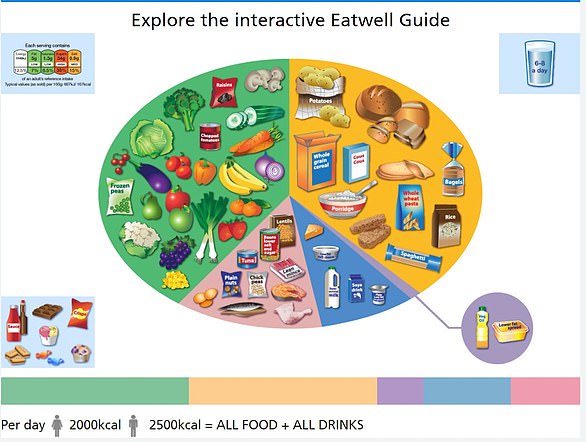Fascinating graphics show exactly what ultra-processed foods do to your body, including ruining your skin and hair
They have become a staple of the modern British diet, piled on the shelves of our supermarkets, in our kitchen cupboards and fridges at home.
Yet ultra-processed foods (UPFs) can send us to an early grave.
Numerous studies have uncovered links between fizzy drinks, biscuits and ready-made meals and a range of health problems, including heart disease and even some cancers.
But UPFs can also have an effect on everyday life, such as making your hair greasy.
A fascinating MailOnline image shows exactly what they can do to your hair, skin and brain.
It’s because researchers at Harvard University found that people who eat more UPFs have a marginally increased risk of early death.
Experts based their findings on a survey of 115,000 healthy American adults who had their health and diet monitored for 30 years.
Researchers found 4 percent more in people who ate about seven servings of junk food per day, compared to people in the study who ate half this amount.
Although the increased risk was only statistically small, the team argued that their findings reflected calls to restrict certain types of UPFs.
UPF is an umbrella term used for anything edible that is made with colourants, sweeteners and preservatives that extend shelf life.
The Nova system, developed by scientists in Brazil more than a decade ago, divides food into four groups based on the amount of processing it has undergone. Unprocessed foods include fruits, vegetables, nuts, eggs and meat. Processed culinary ingredients – which are not usually eaten alone – include oils, butter, sugar and salt
Ready meals, ice cream and tomato ketchup are some of the most beloved examples of products that fall under the umbrella term UPF, now synonymous with foods with little nutritional value.
They differ from processed foods, which are tinkered with to make them last longer or improve their taste, such as cured meats, cheese and fresh bread.
Yet dietitians argue that this far-reaching judgment wrongly stands in the way of ‘healthy’ options such as fish fingers and baked beans.
The new paper adds to growing evidence illustrating the health risks of UPFs, which have been vilified for decades for their perceived link to cancer and dementia.
During the 34-year follow-up period, the researchers recorded 48,193 deaths, including more than 13,000 from cancer and just over 11,000 from cardiovascular disease.
However, no specific association was observed between total UPF consumption and deaths from cancer or cardiovascular disease.
Instead, the increased risk – which amounts to 64 excess deaths per 100,000 person-years – was only seen for deaths from all causes.
They also liked no link between premature mortality and spices, sauces and savory snacks.
Even with sugary drinks and ready-made meals, the risk was less pronounced after researchers took into account the overall diet quality of the participants, who were surveyed about their eating habits every four years.
For some UPFs the risk was up to 13 percent.
Writing in the British medical journalthe scientists said: ‘The findings provide support for limiting consumption of certain types of ultra-processed foods for long-term health.’
But experts today criticized the research.
Sir David Spiegelhalter, emeritus professor of statistics at the University of Cambridge, said: ‘This study shows weak associations between ultra-processed foods and overall mortality.’
Dietitian Dr Duane Mellor, spokesperson for the British Dietetic Association, said: ‘It’s also notable that those who consumed the most ultra-processed foods tended to eat few vegetables, fruit, legumes and whole grains.
‘It may not be as simple as that those who ate more ultra-processed foods were more likely to die earlier – it is entirely possible that these foods could crowd out healthier foods from the diet.’
He added: ‘Not all groups of UPFs are associated with the same health risks, with sugar and artificially sweetened drinks and processed meats most clearly associated with the risk of early death.’
Professor Gunter Kuhnle, an expert in nutrition and food science at the University of Reading, said it was ‘impossible to know how reliable the results are’ because of the way the study was conducted.
He said: ‘The results should therefore be treated with great caution.
“I don’t think this study provides evidence to suggest that certain foods are restricted just because of their level of processing.”

Food experts say some UPFs can be “part of a healthy diet.” Baked beans, fish fingers and wholemeal bread all do the trick, according to the British Nutrition Foundation (BNF). Tomato-based pasta sauces, wholegrain cereals and fruit yoghurts are also ‘healthier processed foods’, says the charity
‘Public health policy must be based on evidence, and there is very good evidence on the health effects of foods based on their composition – which is largely confirmed by this study.
‘In contrast, there is still virtually no robust evidence for an effect of ‘ultra-processing’ specifically on health.’
Britain is the worst in Europe when it comes to eating UPFs, which make up an estimated 57 percent of the national diet.
They are thought to be a major cause of obesity, which costs the NHS around £6.5 billion a year.
They often contain colorings, emulsifiers, flavorings and other additives and typically undergo multiple industrial processes that research has shown affect the physical structure of foods, causing them to be quickly absorbed.
This in turn increases blood sugar levels, reduces satiety and damages the microbiome – the community of ‘friendly’ bacteria that live within us and on which we depend for good health.

